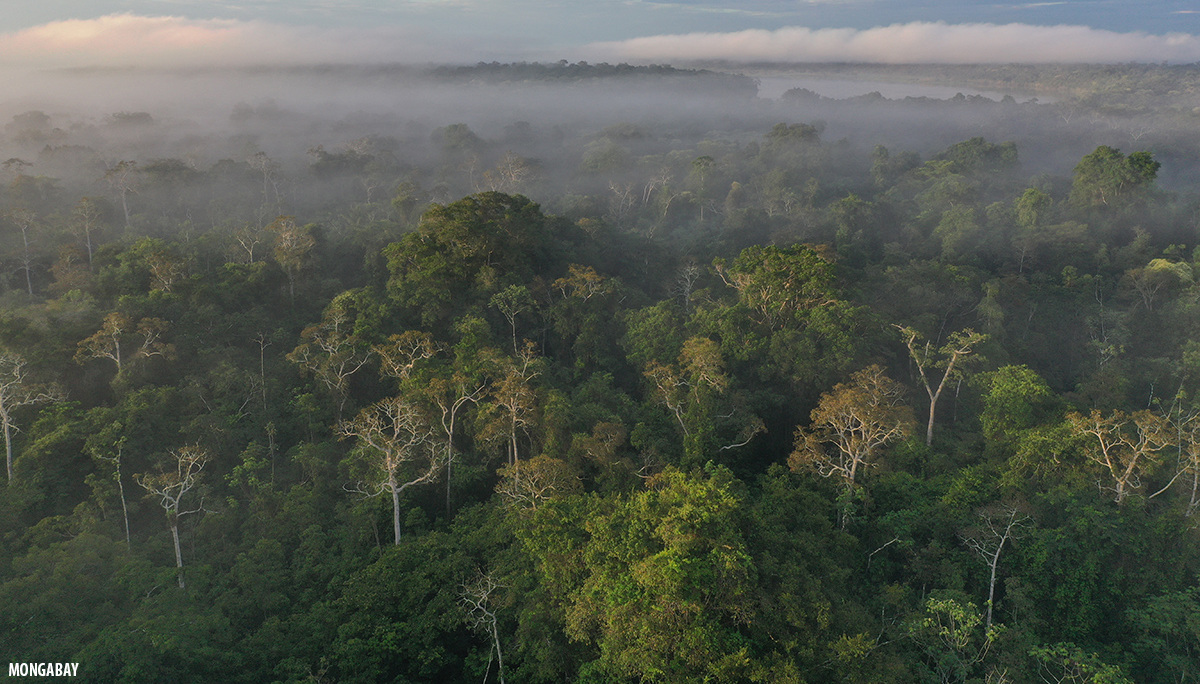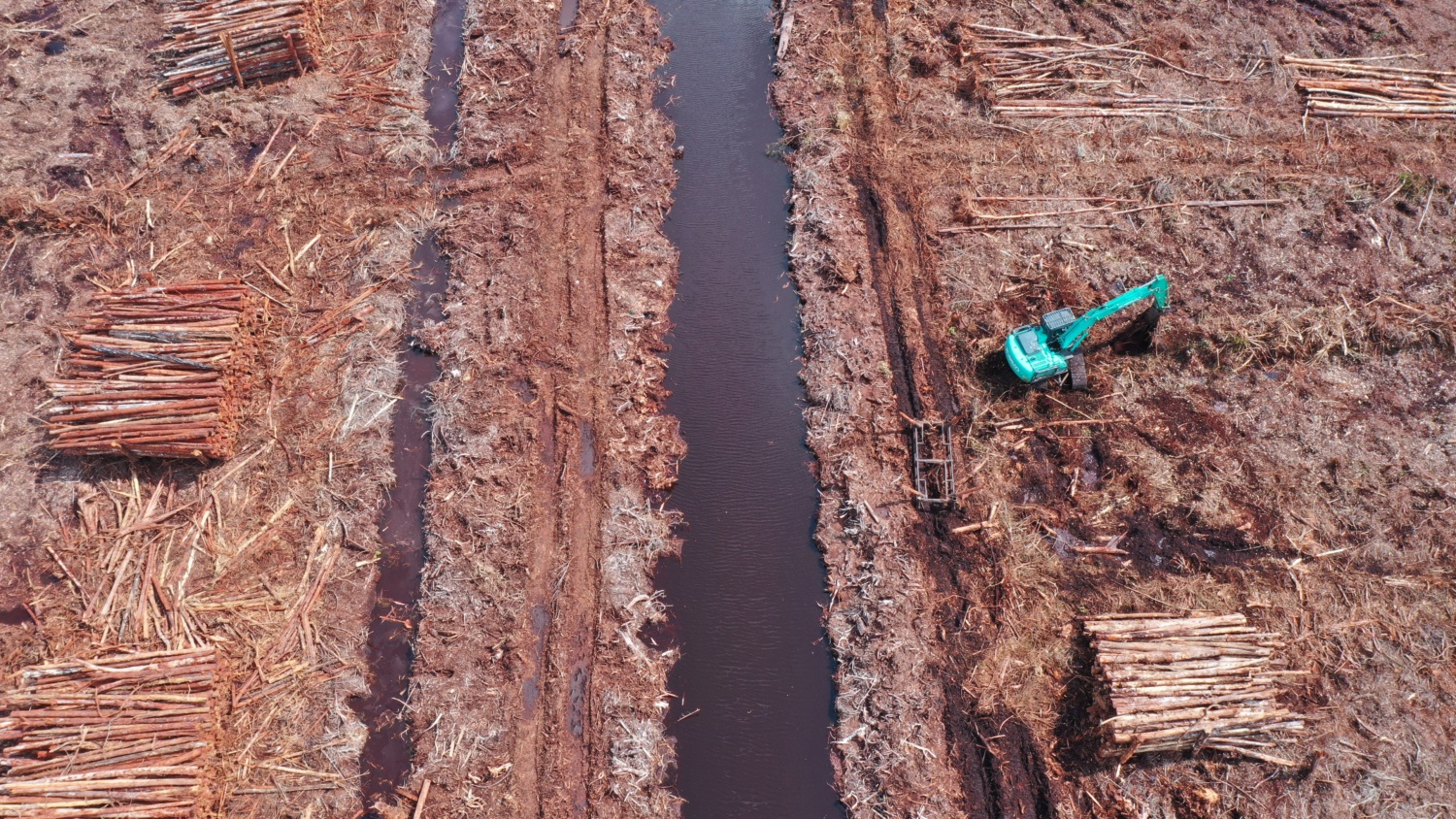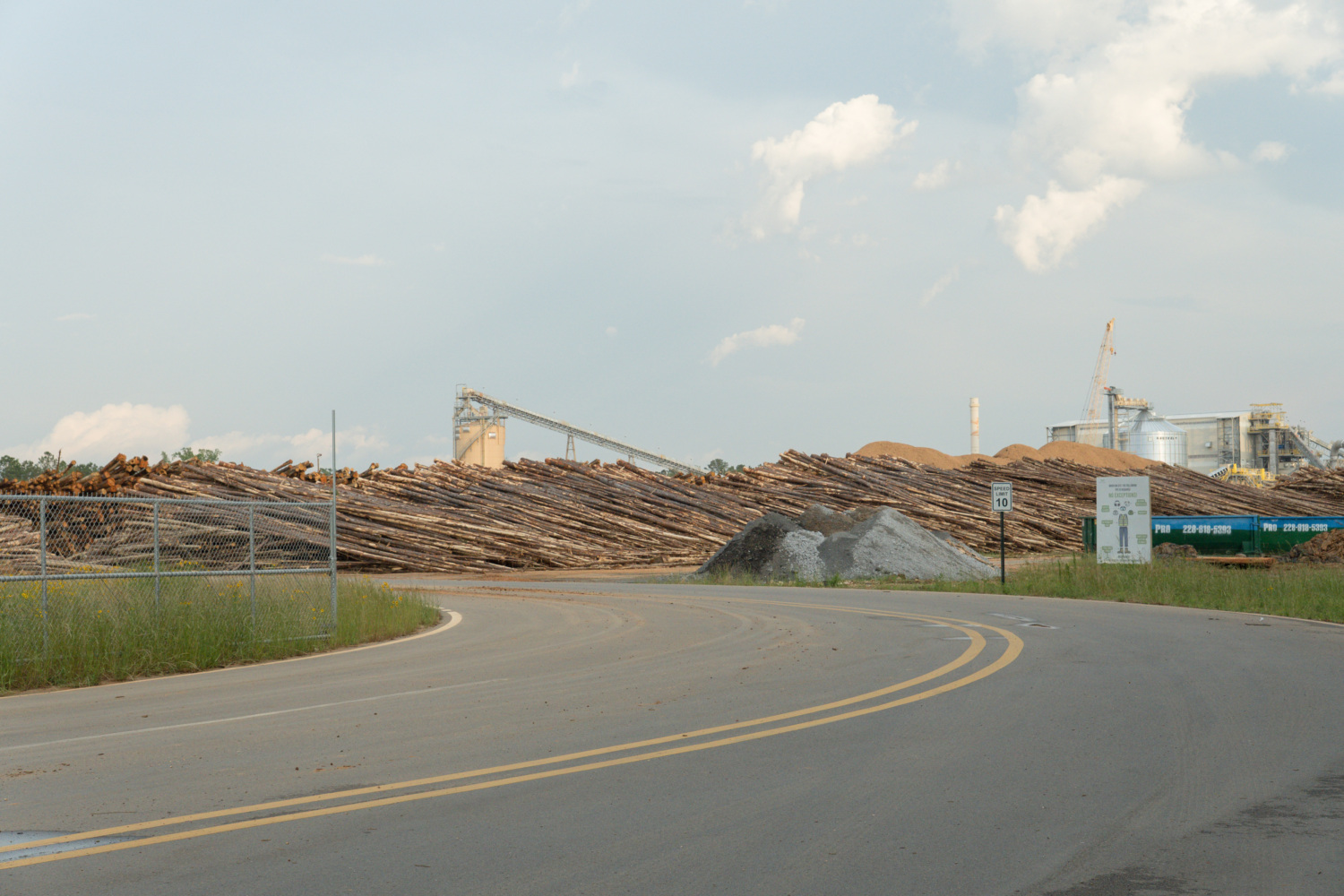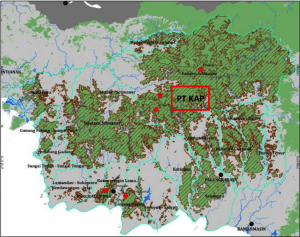
Rapid Response Success Stories
Mighty Earth’s Rapid Response monitoring system is leading to faster interventions by palm oil traders to address cases of deforestation and peatland development.
Rapid Response has incentivized palm oil traders to secure moratoria on further plantation development, publish new grievance protocols and track grievances, engage with non-compliant suppliers to bring them into compliance, and suspend non-responsive suppliers from their supply chains. Since launching Rapid Response, there has been universal adoption of public grievance tracking by every trader we have communicated with about the project.
Our work has had an impact on reducing deforestation in supply chains and driven greater transparency for grievance documentation and resolution by traders. Mighty’s Rapid Response program has contributed to securing moratoriums on any further land clearing from twelve groups–BEST Group, Double Dynasty Group, Eagle High Plantations, Felda Global Ventures, Genting Plantations Bhd, Incasi Raya Group, NPC Resources Bhd, NT Corp, QL Resources Bhd, Ta Ann Group, TH Plantations Bhd, and Instant Star Holdings (IJM)–and NDPE policies (including moratoriums on any further land clearing) from five groups–Austindo Nusantara Jaya, BLD Plantation Bhd, KPN (formally known as GAMA), Samuel International Group, and Bunga. Our results at the group level stem from the fact that our work has incentivized palm buyers to suspend noncompliant groups from their supply chains more than two hundred and sixty times.
To illustrate our results, here are a number of recent success stories where intervention by traders resulted in stopping deforestation. While halting clearing is an important first step, we urge every palm oil company to adopt and become fully compliant with No Deforestation, No Peat, and No Exploitation (NDPE) policies. These include adopting a Group-level NDPE policy that requires them to adhere to the High Carbon Stock Approach methodology and implementing recovery plans to remediate the impacts of past non-compliance.
Success Story: Widya Corporation held accountable for failed High Carbon Stock (HCS) forest assessment process
In the PT Mulia Inti Persaka concession owned by the Widya Corporation, Mighty Earth found 1,304 ha of deforestation between August 2018 and January 2020 (satellite images below).
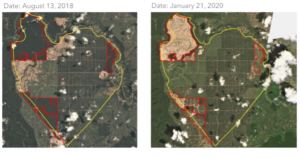
Mighty Earth initially published this case in Rapid Response Report 6, showing 30 ha of deforestation by PT Mulia Inti Perkasa in July of 2018, traders did not immediately act. As deforestation in PT Mulia Inti Perkasa continued, Mighty Earth published twelve follow-up reports on the case (listed in the table below).

As part of their No Deforestation, No Peatland, and No Exploitation (NDPE) policy, Widya (and much of the palm oil industry) utilizes the High Carbon Stock Approach (HCSA) whichh allows trplantation companies to conduct an HCS assessment where an independent assessor classifies landcover and determines which areas contain variable areas of natural forest to be protected. The HCSA underpins the private sector NDPE policies that have been instrumental to the dramatic declines in deforestation connected to palm oil in Southeast Asia.
Upon initial assessment of the PT Mulia Inti Persada concession, the 2018 HCS assessmentconsidered the area as “scrub,” meaning that it wouldn’t qualify as deforestation under Widya’s NDPE policy. Mighty Earth challenged this, as our team believed that the deforestation the areas cleared (in pink in the image below) was HCS forest.
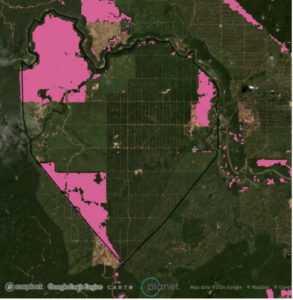
After years of engaging with one progressive trader and the HCSA Secretariat, the HCS assessment was put through a peer review process, after which it was determined that the land cleared was in fact HCS forest.
For the integrity of the HCSA system, the independent assessor must properly identify HCS forest areas. In this case, Mighty Earth uncovered a shortcoming – the original HCS assessment failed to identify HCS forest correctly, and so the Widya Corporation cleared forest that should have been protected. Mighty Earth had to challenge it to prove that the clearing was of forest. With this proof of deforestation, Widya has now agreed to compensate by protecting 5,640 ha of forest in North Kalimantan near their concession that wouldn’t be conserved otherwise. Grievance mechanisms and the HCSA system are vital to helping companies identify forest land (where they should avoid clearing), allowing Mighty Earth and others to ensure that companies are held accountable for deforestation and compensate accordingly.
Success Story: Bunga
As detailed in Rapid Response Report 32, the group Bunga was found to be clearing forest in the concession Value Greenworld Sdn Bhd in Kelantan, Malaysia. Mighty reported that between November 2019 and October 2020, an estimated 255 hectares of forest were cleared.
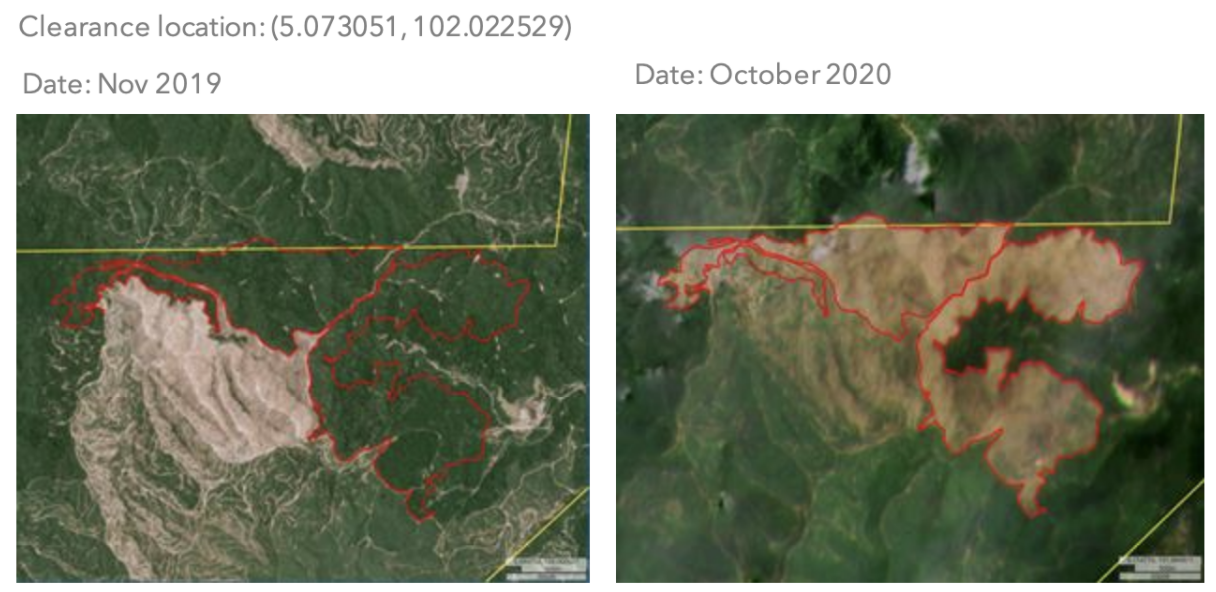
Grievances were filed with 16 traders including ADM, Bunge, Sime Darby, and Wilmar, the biofuel company Neste, and 17 consumer brands including Hershey, Colgate-Palmolive, General Mills, and PepsiCo.
As a result of trader engagement, Bunga announced the full adoption of an NDPE policy. Bunga has pledged to conserve HCS and HCV areas, respect native land rights, and increase transparency in its supply chain.
Success Story: Instant Star Holdings Sdn Bhd & IJM Plantations
In Rapid Response Report 30, Mighty found evidence that 112 hectares of forest were cleared in the Aspirasi Kristal (M) Sdn Bhd concessions (areas A & B) between January 2019 and July 2020. Mighty filed grievances with 13 palm traders, 16 consumer brands, and a biofuel company.
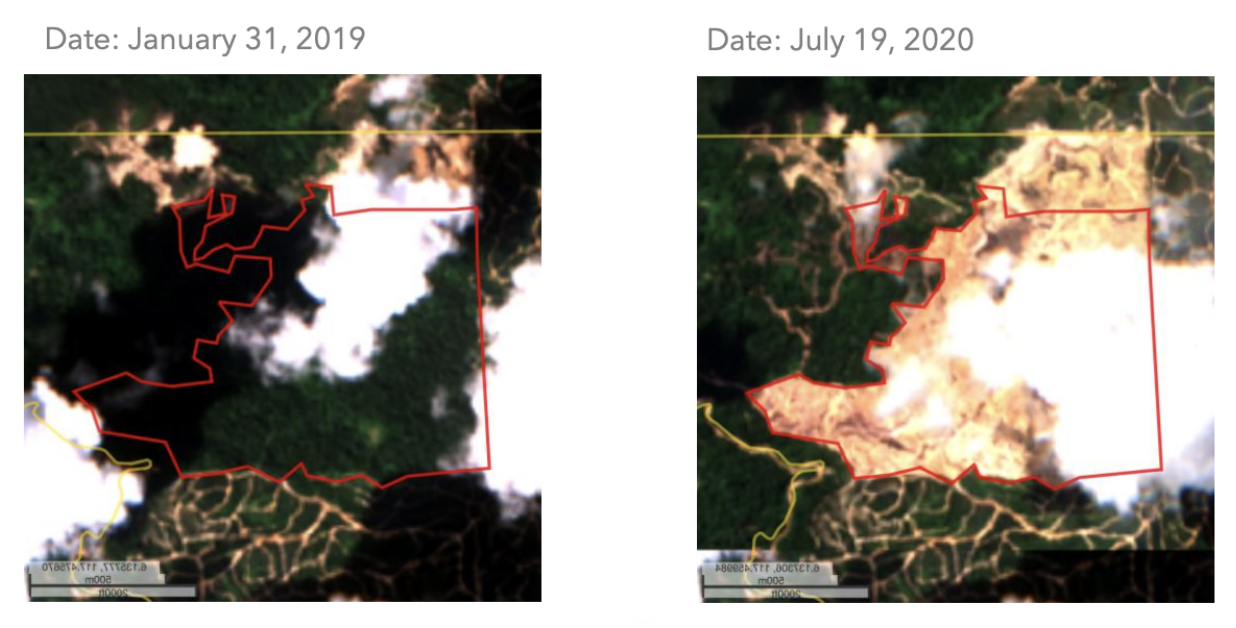
In response, IJM Plantations, which lists Aspirasi Kristal plantations as a direct supplier, provided Mighty Earth with published evidence of a newly adopted NDPE policy and ensured that Aspirasi Kristal agreed to the NDPE commitment. In conjunction with IJM’s NDPE commitment, Instant Star Holdings–the majority shareholder (66.34%) of Aspirasi Kristal plantations–pledged to a group wide moratorium on any further development without proper peer-reviewed HCV/HCS assessments.
Success Story: Tabung Haji Plantations
PT Persada Kencana Prima, a subsidiary of Tabung Haji Plantations (TH Plantations), cleared and developed a total of 3,708 hectares of peatland forest and non-forested peatland between January 2015 and July 2017.
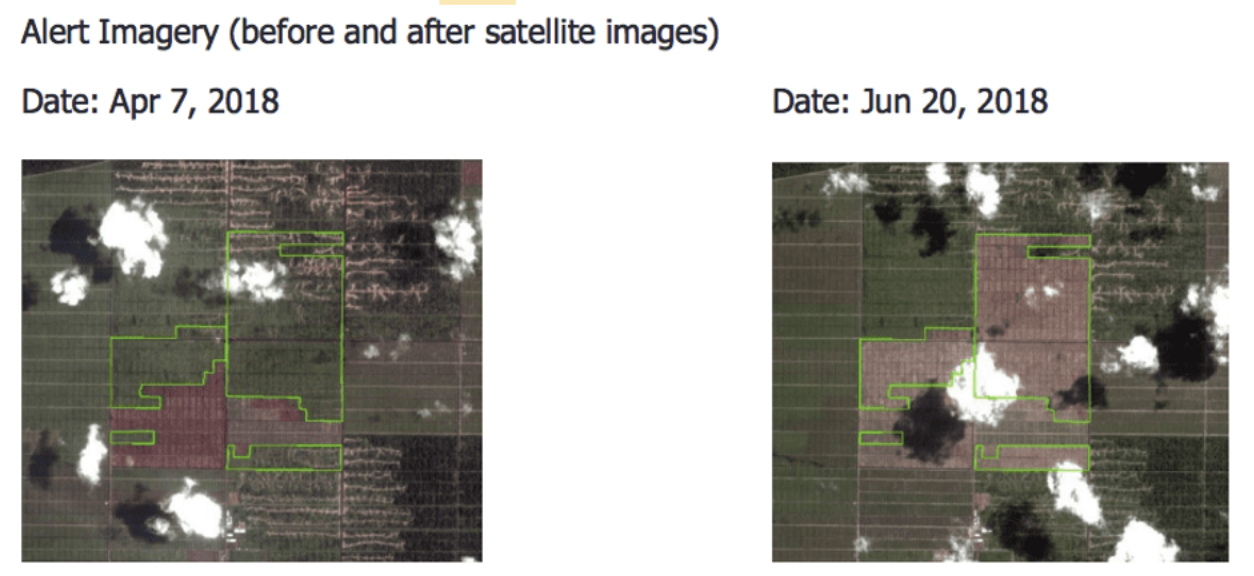
TH Plantations adopted a moratorium on further land development in PT Persada Kencana Prima in July 2017 after a Greenpeace report exposed deforestation and new peatland development in the concession. However, between April 7 to June 20, 2018, a further 217 hectares of peatland forest were cleared – as documented in Rapid Response Report 5. Evidence on this case has also been published by other NGOs.
A number of traders – ADM, Cargill, GAR, IOI Group, Louis Dreyfus, Musim Mas, Olam and Wilmar – have either suspended trade with Tabung Haji Plantations or engaged with Tabung Haji Plantations, directly or through their third-party suppliers, calling on the company to honor its moratorium on deforestation. As a result of this engagement, Tabung Haji Plantations recommitted to its agreement to complete High Conservation Value (HCV) and High Carbon Stock (HCS) forest assessments before any further development takes place.
Success Story: Gama Group
PT Agriprima Cipta Persada, which is part of the Gama Group, was featured in Rapid Response reports 3 and 4. PT Agriprima Cipta Persada cleared 2,847 hectares of forest in 2015 and 2016, and cleared or degraded a further 185 hectares of forest between November 2017 and June 2018.
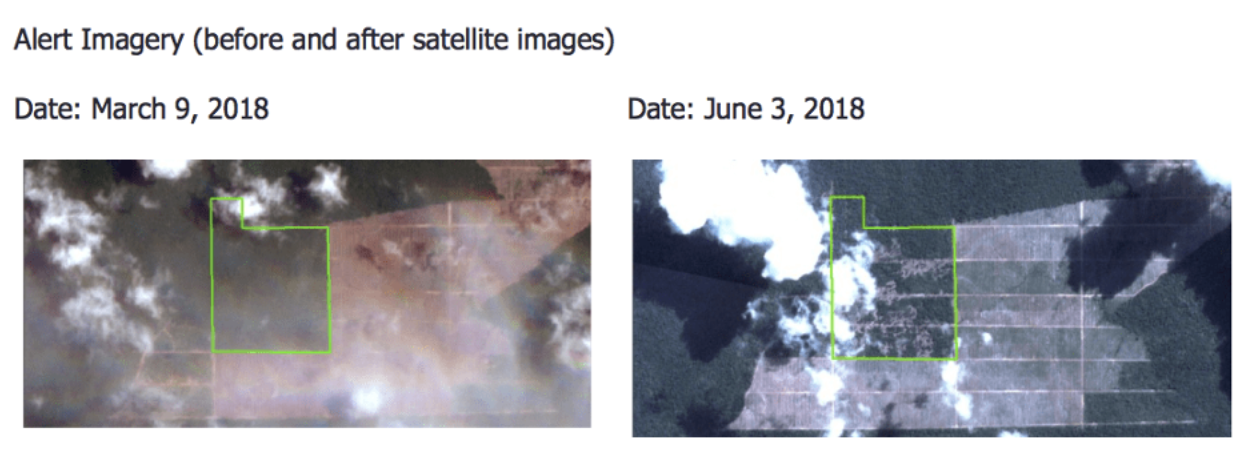
PT Agrinusa Persada Mulia, another Gama Group concession, was also featured in Rapid Response Report 3. Between May and November 2017, 2,361 hectares of forest were cleared in this concession.
A number of traders – ADM, Bunge, Cargill, GAR, Louis Dreyfus, Musim Mas, Olam, and Wilmar – have engaged with Gama Group, directly or through their supplying traders, or suspended trade with the company. As a result of this engagement, as well as ongoing campaigns by other NGOs including Greenpeace, in August 2018, the Gama Group issued a moratorium on further forest clearance, applicable to all of its group controlled concessions and operations. Soon after, Gama Group released a group-wide NDPE palm oil policy.
Additional Suspensions
Engagement efforts by a number of traders has also led to the suspension of non-compliant suppliers from their supply chains when the supplier refuses to halt the ongoing clearance and adopt a group level NDPE policy. More than 260 individual supplier suspensions are linked to Rapid Response cases. This has significantly reduced the market access for many rogue plantation groups and suppliers. As a result of our outreach to the palm oil industry, a number of the worst companies have been permanently suspended by major palm oil traders with NDPE policies.
PARTNERS
![]()

